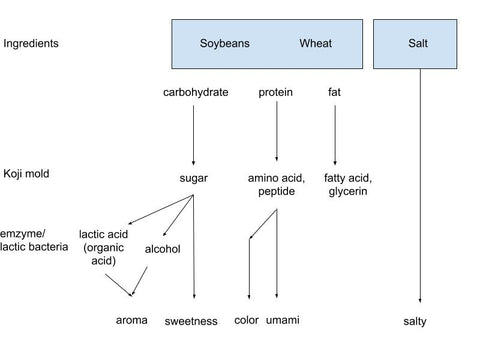No products in the cart.
The main ingredients of soy sauce are soybeans, wheat and salt.
The unique characteristics of soy sauce as a seasoning are its color, taste and aroma. The taste comes mainly from the protein in the soybeans. On the other hand, the aroma comes from the starch of wheat by the actions of microorganisms. Furthermore, the color comes from the combination of amino acids from proteins, glucose from starch. Sodium chloride regulates the function of microorganisms such as koji mold, lactic acid, and yeast. All the ingredients interact with each other, and slowly they are fermented and maturated before becoming soy sauce.
Alcohol is added to prevent the occurrence of white mold.
There are soy sauces where alcohol is also listed on the label as an ingredient along with soy and wheat. The reason why alcohol is added is to prevent the occurrence of white mold. White mold is also known as firm yeast and is often found when soy sauce is made at home and sold by weight. At that time, even the white mold formed, they strained with cloth and used regularly.
The white mold is a type of halophilic yeast, similar to the white film-like substance that covers the surface of the fermented rice bran bed. It is harmless to the body but since it degrades the flavor and the aroma of the soy sauce, countermeasure are taken to prevent its occurrence in the bottle.

